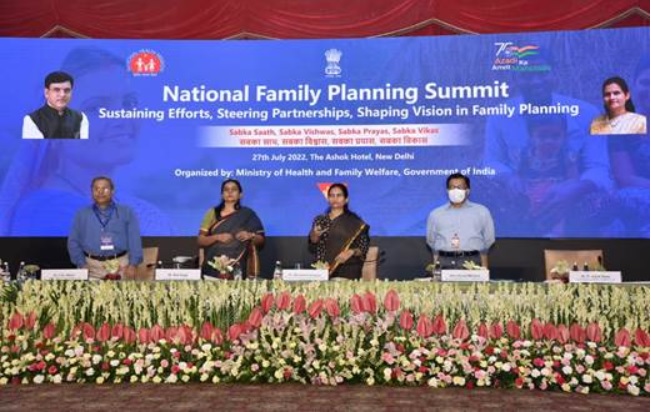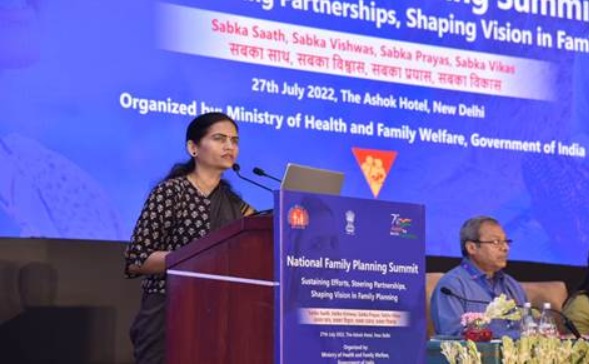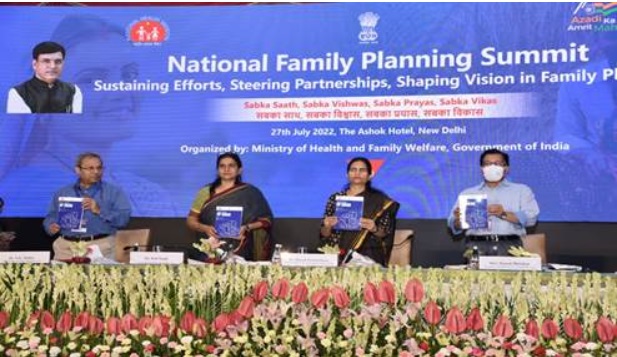“India understood the importance of Family Planning early and went on to be the first country to launch a National Family Planning programme in 1952.” This was stated by Dr. Bharati Pravin Pawar, Union Minister of State for Health and Family Welfare as she chaired the National Family Planning Summit, 2022, here today. Aligning with Hon’ble Prime Minister’s vision of Atma Nirbhar Bharat, the theme of the summit was “Sustaining efforts, Steering Partnerships, Shaping Vision in Family Planning – Sabka Saath, Sabka Vishwas, Sabka Prayas & Sabka Vikas”.

Speaking on the occasion, Dr Pawar informed that “India has achieved replacement level fertility with as many as 31 states/ UTs having achieved a Total Fertility Rate of 2.1 or less and modern contraceptive usagehas increased substantially to 56.5% (NFHS 5). She also stated that “NFHS-5 data shows an overall positive shift towards spacing methods which would be instrumental in impacting positively the maternal and infant mortality and morbidity.”
The Union Minister emphasized that Mission Parivar Vikas (MPV) 2016 has given further impetus to the National Family Planning Program. Under the scheme, innovative strategies like distribution of Nayi Pehel kits, Saas Bahu Sammelan and Saarthi vans are helping to reach out to community and initiate dialogues on Family Planning, healthy birth spacing and importance of small families. “More than 17 lakh Nayi Pehel kits have been distributed to newly-weds, over 7 lakh Saas bahu sammelans conducted, and over 32 lakh clients have been counselled through Saarthi vans since inception. It is due to these efforts that NFHS-5 data shows a substantial increase in modern contraceptive use and decrease in unmet need in all the MPV states”, she added.

The Minister highlighted that India is an important member of the FP2020, now transitioned to FP2030 partnership. She informed that as part of India’s commitment to this partnership, 3 billion USD has been invested in family planning. She further stated that “between 2012 and 2020, India added more than 1.5 crore additional users for modern contraceptives thereby increasing the modern contraceptive use substantially”.
During the event, the Minister also unveiled the India Family Planning 2030 vision document and launchedthe Medical Eligibility Criteria (MEC) Wheel Application, E-Module of Family Planning Logistics Management System (FPLMIS) and Digital Archive on Family Planning under the category of Digital Intervention. To empower the community and show the Government's unwavering commitment to providing inclusive services, Dr Pawar also introduced the National Family Planning helpline manual, Community Health Officer (CHO) booklet, and ASHA brochure and leaflet (Family Planning).

Dr Pawar commended the grassroots health service providers calling them “Champions whose unwavering efforts are vital to the program's success”. She felicitated the states under the categories of Male Participation, Spacing Methods, Self-care Methods, PPIUCD and Injectable MPA. Service Provider Awards were also presented to Doctors (under the categories of Male and Female Sterilization), Nurses (under the categories of PPIUCD and Injectable MPA), Health and Wellness Centres for best performance in Family Planning and to ASHA workers for motivating vasectomy clients.
Union Health Secretary, Shri Rajesh Bhushan stated that Family Planning Programme in India is now over seven decades old and in this period, India has witnessed a paradigm shift from the concept of population control to population stabilisation to interventions being embedded towards ensuring harmony of continuum care. In this context, he underlined three thematic areas. Firstly, although India has achieved replacement level fertility, there is still a significant population in the reproductive age group who must remain at the centre of our intervention efforts. Secondly, India’s focus has traditionally been on the supply side, i.e. the providers and delivery systems. He highlighted that now the time is to focus on the demand side which includes family, community and society. “Significant change is possible with this focus, instead of an incremental change”, he noted. States should make special efforts to leverage from the provisions of the community-based scheme under Mission Parivar Vikas and refine it further. And lastly, the pool of family planning service providers should assume a significant role in enhancing our capacity to deliver our commitment under FP2030, through knowledge, skills and innovative services. “A competent and properly trained workforce must be the foundation of our family planning effort. This will enhance the quality of our services”, he stated.

Ms. Roli Singh, Additional Secretary and Mission Director (NHM), Ministry of Health and Family Welfare, Dr S K Sikdar, Advisor FP and MH, and representatives from various development partners were also present.